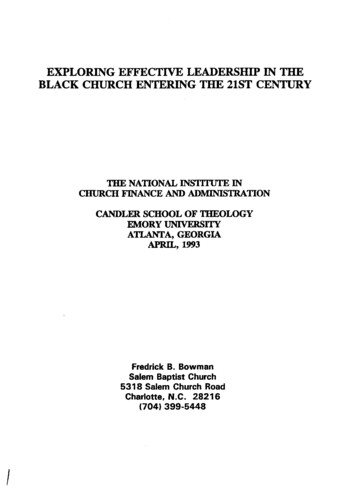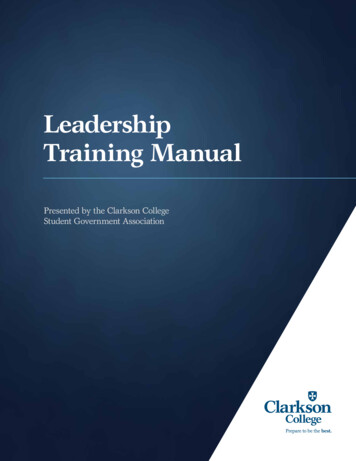
Transcription
EXPLORING EFF'ECTIVE LEADERSHIP IN THEBLACK CHURCH ENTERING THE 21ST CENTURYTHE NATIONAL INSTITUTE INCHURCH FINANCE AND ADMINISTRATIONCANDLER SCHOOL OF THEOLOGYEMORY UNIVERSITYATIANTA, GEORGIAAPRIL, 1993Fredrick B. BowmanSalem Baptist Church5318 Salem Church RoadCharlotte, N.C. 28216(704) 399-5448I
·'\,'\. '·''lglTABLE OF CONTENTSACKNOWLEDGMENTSPREFACEINTRODUCTIONBmUCAL FOUNDATIONSI.n.CHURCH ADMINISTRATION IN THE BLACK PERSPECTIVEA.Constituent MembershipB.Church Office Staff and VolunteersC.Clergy Staff and VolunteersD.ConsultantsE.Future Implications for MinistryCHURCH LEADERSHIP PREPARING THE NEXT GENERATION - "OURYOUTH"A.How Can the Church Help Youth Survive?B.What Can the Church Do?l.2.C.How Youth Can Help the Church Survive?l.2.3.4.ill.Reach, Teach and EquipPrepare ersLeadersAdvocatesTHE BLACK CHURCH LEADERSHIP OF THE FUTURECONCLUSIONBmUOGRAPHYAPPENDICES
ACKNOWLEDGMENTSThank you, God, for Your grace, which goes to the depths of my being and turnsdarkness to light, brings forward the good, and blesses me. Thank You for bringing to myconscious awareness any changes that I need to make. As I make alterations in my life, I drawto me new and greater good. I would like to personally thank Reverend Anthony L. Jinwright,Pastor of Salem Baptist Church for each opportunity given to me to create new growth andachievement. To Pastor Jinwright, and the Salem Church Family, I am grateful for a continuingawareness of your patience, tolerance and most of all, your prayers. God Bless You All!!!
PREFACEHistorically, the Black Church has been one of the primary institutions in the BlackCommunity. It has served as a place of refuge from oppression, a place where the importanceof education has been handed down from generation, a place where Black people were able togain the skills which produced our leaders, and a center for political education and politicalparticipation. But mot important! y, the church has served as a cornerstone for spiritual maturityand renewal.Salem Baptist Church's historical roots from its early beginnings in 1874 reflects acommunity of regenerated believers who have faithfully served God over one hundred and fifteenyears. Salem's membership has grown from a little over five hundred members in 1987 to thepresent day of over fourteen hundred. I am truly blessed to have the opportunity from the divineguidance of God, to serve as the Administrative Assistant to the Senior Pastor. Because I workwith God, I work easily, without stress, strain, or struggle.Working with God helps meunderstand that, no matter how complex or demanding my work may be, I am not workingalone.Divine intelligence inspires me with creative ideas. Divine love flows through my heartand uplifts me. Divine strength gives me power in every needed way. Divine order fits everydetail into a perfect pattern of efficiency and productivity. As I work with God, my assignmentsare done with ease. Working with God gives me inner joy and a feeling of accomplishment.The transition from employment in corporate jobs to a church ministry has allowed me anopportunity to explore the need for effective leadership within the Black Church. What we needfor our Black churches sake today is good people with strong beliefs. People who are willingto take strong stanceson issues of importance from a biblical frame of reference. Asa result.
God's view will be known. Hopefully, our mistakes of the past can be corrected because weare losing more than we know.
INTRODUCTIONWhat kind of leaders do we need? Confidence in our leaders has been severely shakenby events of recent years. Whether in government, business, education or religion, to serve asa leader is to be under the microscopic scrutiny of the public eye. Credibility of leadership isno longer taken for granted. Position no longer assures respect. Leaders of the twenty-firstcentury will have to overcome the lengthening shadows and the lingering doubts which nowfollow prominent people in every sector of our society."Integrity" is the standard,"accountability" is the demand and "credibility" is the judgment.granted.None will be taken forWhether a leader is in a Christian or secular setting, there is no difference.Confidence must be earned every day; credibility is no longer automatic; and competence is anopen question! 1This is a pivotal moment in the history of the African American church. It is a time inwhich both leaders and laity are reviewing the results of data from the 1990 edition of the UnitedStates Census, to interpret its meaning for the African American community. African Americansare watching daily news programs and talk shows, and listening closely to sermons beingdelivered from pulpits. As the Black community heads toward the 21st century, many peopleare watching the progress of the famine in Ethiopia and the political crisis in South Africa asreported through white-controlled media.Others are noting the bombs which have rippedthrough many communities of Africa descent in various parts of the African Diaspora during theclosing decades of the 20th century.McKenna, David L. 1989. Power to Follow Grace to I eyd. Word, Canada: WordPublishing.1
On the home front, many are taking notes on the escalation of drugs and related crimesin African American communities, and many are noting the multiplication of the HIV virusthroughout Black communities. Black people are noting the rising unemployment rates, theescalating infant mortality figures, and the gradually declining life expectancy figures for AfricanAmericans (African American males, in particular). However, while many despair, AfricanAmericans who have a personal relationship with Jesus Christ realize that in Him, that is, inobedience to Him, there is hope.The African American church is being called upon to take the steps necessary to tumaround the trends which threaten the survival of the Black church and the Black community aswe know them today. In this critical moment, God's people must glance behind, perhaps to thistime last century, to access where they have been. Then God's people must examine the Blackcommunity today, and the position of the Black church within that community. Then the Blackchurch, with God as its Helper, will be in a position to chart the course for the future, andposition the Black church in the Black community of the 21st century.
BmUCAL FOUNDATIONS1)TO "EQUIP THE SAINTS FOR THE WORK OF MINISTRY" (EPHESIANS 4:12,RSV).2)TO "SET AT LmERTY THEM THAT ARE BOUND." (ISAIAH 61:1 and LUKE4:18)3)TO REVEAL THE GWRY OF THE WRD THAT" ALL FLESH SHALL SEE ITTOGETHER" (ISAIAH 40:5)
"17wugh I speak with the tongues of men and of angels, and have not charity, I ambecome as sounding brass, or a tinkling cymbal. And thaugh I have the gift of prophecy, andunderstand all mysteries, and all knowledge; and though I have all faith, so that I could removemountains, and have not charity, I am nothing. And though I bestow all my goods to feed thepoor, and though I give my body to be burned, and have not charity, it projiteth me nothing.Charity suffered long, and is kind; charity envieth not; charity vaunteth not itself, is not puffedup, Doth not behave itself unseemly, seeketh not her own, is not easily provoked, thinketh noevil; Rejoiceth not in iniquity, but rejoiceth in the truth; Beareth all things, believeth all things,hopeth all things, endureth all things. Charity never faileth: but whether there be prophecies,theywhether there be tongues, they shall cease; whether there be knowledge, it shallvanish away. For we know in pan, and we prophesy in pan. But when that which is perfectis come, then that which is in pan shall be done away. When I was a child, I spake as a child,I understood as a child, I thought as a child: but when I became a man, I put away childishthings. For now we see through a glass, darkly; but then face to face: now I know in pan; butthen shall/ know even as also I am known. And now abidethfaith, hope, charity, these three;but the greatest of these is charity (I Corinthians I3).
I.CHURCH ADMINISTRATION IN THE BLACK PERSPECTIVEA. Constituent MembershipToday there are approximately twelve million black Baptists in the United States. Thefollowing chart illustrates the breakdown according to convention.Not included are thePrimitive Baptists and those churches belonging to no convention. It is no accident that blackBaptists comprise the largest single religious group in black communities. 2Name of OrganizationNo. of ChurchesConstituentMembershiP1) National Baptist Conventionof America10,0003,000,0002) National Baptist ConventionU.S.A., Inc.30,0008,000,0003) Progressive National BaptistConvention, Inc.1,0001,000,0002Massey, Floyd and McKinney, Samuel. 1989. Church Administration The BlackPenpective. Valley Forge, PA. : Judson Press.2
B) CHURCH OFFICE STAFF AND VOLUNTEERSFew black churches have an office staff of more than one full-time secretary. Where sizedemands and funds allow, the pastor should have an office secretary who can serve as anadministrative assistant.Even though secretaries are technically hired by the trustees, asexecutive officers of the church, the pastor should recommend to that body the secretary to behired. Much follow-through can be effected by an administrative secretary without the conflictoften caused by an assistant pastor, frequently nonsalaried.In almost all black churches, there is use of volunteer personnel -- not only because oflack of funds, but because service freely given is essential to Christian stewardship. Wise is thepastor who has the ability to choose good people and who trains them and puts them to work.Blessed is the church, too, that will especially utilize its greatest source of volunteers, namely,the youth and senior citizens.Again, there must be an understanding of authority and responsibility. While othersstress what can be done only by paid staff, black churches go ahead to do the job with volunteerhelp. Often, volunteer help does almost as well as a paid staff -- sometimes better, especiallyon short-term projects. This is not to say that full-time paid staff is not better in some areas,but the black church would never get off the ground if it waited for the time when full-time paidhelp could be acquired.3
C) CLERGY STAFF AND VOLUNTEERSFew black churches have more than one full-time clergy on the payroll because of thelack of funds. Moreover, it must be kept in mind that the black church, by and large, finds itdifficult to function under more than one pastor. Black people tend to be unable to look at twoleaders with apparent equal status within the same house, without becoming "crossed-eyed".Even with the finances available, the use of co-pastors will usually cause rough sailing.The black church looks to the pastor to lead, guide, and direct. This is not to state thatthere cannot be clergy assistants, but it should be clearly understood that they are assistants-tothe-pastor, responsible for the pastor, and subject to the pastor's appointment and removal.Where such is not the case, there is always danger of confusion at the top.Frequently,members who desire confusion will tell an assistant that he should be the pastor. He is silly tobelieve them. The man whose salary the black congregation pays is the one they want forpastor.Where the church has a staff of paid clergy in various capacities, the pastor should havethe authority to assign responsibilities and to hire and fire. The same is the case with musicians.The officers receive the pastor's recommendation and reach agreement with him on hiring, butthe ultimate choice should be made by the pastor, because it is the pastor who has to work mostclosely with staff. The pastor should delegate authority and require accounting and stewardship,with a clear understanding regarding role definitions. Such can assure a harmonious relationshipbetween pastor and assisting staff. They should not allow others to weaken their confidence inone another or their loyalty as teammates.4
D) CONSULTANTSIn many areas of the business world, consultants have been used in great numbers inrecent years. A church may not be able to hire full-time assistants, but enrichment comes in theutilization of the services of consultants whenever and wherever possible.In fact, in building and financial programs, the expert is being called upon more andmore. While a small minority still feels that God gives the pastor the answer to every aspectof the church's program, the wise pastor must realize that God can lead him to the expert in aparticular field who is prepared to deal with the problem professionally. God works moreefficiently in many areas through the pastor's trained consultant. Wise is the pastor who knowshow to show up his own skills through skills of others.5
E) FUTURE IMPLICATIONS FOR MINISTRYWhat does the future hold for black Baptists, a classless society with a tradition offreedom and a free-flowing style of administration? What are the future implications of lay andpastoral relationships? What are future implications of power arrangements in black Baptistchurches? What are future implications for black structure?Question #1What does the future hold for black Baptists with a tradition of freedom and free-flowingstyle of administration?The black church is concerned with nurturing values and norms in the individual,family, and peer groups, as well as affecting the total life of the community, asit brings its special vision to be pilgrim people. Some administrative skills mustbe concerned with issues of social control, must seek to ensure a certain amountof conformity, and must discourage disruptive behavior.New administrativemethods of institutional maintenance must emerge in the future. It must developan educational system to perpetuate the spiritual. In other words, the church mustdevelop an economic base sustained by the faith of the fathers.Question #2What are the future implications of lay and pastoral relationships?Churches must adopt and create a stronger lay ministry. Emphasis in lay ministrymust concentrate on areas of education, stewardship, missions and evangelismbased on a twenty-first century world view. The pastor must lead the laity intheir development by sharing leadership with them. Black churches need to take6
a page from the Jewish and Oriental people who, in an alien culture, developededucational vehicles to ensure community cohesiveness.Question #3What are future implications of power arrangements in Black Baptist Churches?Both pastors and congregations have had to adjust to the expanding roles nowopen to the clergy. On the other hand, far too many clergy are threatened by awell-informed laity and challenges too great for some to cope with. Faithfulnesshas its own reward. A faithful pastor will be maintained as the leader of thecongregation without question as long as he provides opportunity for growth,opportunity to share in decision-making processes, and opportunity to be a viablepart of the tribe/clan/family church. The other option is for the senior pastor tobe a "generalist," not a specialist, with a team.In the role of generalist,however, the pastor may experience role conffict from occupying two or moreroles that have contradictory expectations.Question #4What are future implications for black structure?The emerging Black church successor to visions, possessing an informed andstrong laity, with resources resulting from sound stewardship, with pastorssteeped in the history, culture, and faith of their people, who are true to itshistoric prophetic witness, equipped with sound and tested administrativeprinciples, can emancipate not only black people but all people. This church willlead mankind to the Eternal's holy hill. Assembled before the Lord of history,7
his glory shall be revealed, and all flesh shall see and experience theirsalvation/liberation together.8
II.CHURCH LEADERSHIP PREPARING THE NEXT GENERATION - "OURYOUTH"Throughout history, the African American Church has played a powerful role in the livesof African American youth. However, today Black church youth are confronted with seriouschallenges brought on by special problems which so many African American youth must face.Current statistics reflect both positive and negative realities. On the positive side, the AmericanCouncil on Education reports that the gap between Black and white youth who graduate fromhigh school is narrowing. Today 76.1% of Black youth graduate compared to 82.1% for whites,and 30.8% of Black youth attend college compared to 38.8% for white youth. 3On the negative side, the U.S. Census Bureau reports that only 37% of Black childrenare born into two-parent families, compared to 77% of white youth.4 The U.S. Department ofCommerce reports that 43.2% of Black families with children who are 18 or under are inpoverty, compared to 14.1% for white families. 5 The U.S. Department of Labor reports thatthe unemployment rate for Black youth is 12.2%, compared to 5.3% for white youth. 6 TheNational Center for Health Statistics reports that 48% of Black males who die between the agesof 15-19, die of gunshot wounds, compared to 18% for white youth. 73American Council on Education, News Release, January 20, 1991.4United States Department of Commerce. Bureau of the Census.sne Black Population of the United States, March 1990.6United States Department of labor, News Release, May 1991.7National Center for Health Statistics, News Release, March 14, 1991.9
A recent Gallup Poll reported that 54% of Black youth who were interviewed felt thatdrug abuse was the biggest problem facing young people. 8In response to these realities, Black churches are reaching out to young people in avariety of ways. However, research indicates a need for a wider range of strategies to reachtoday's youth. Is it possible that if Black churches had a better range of services for youth, theymight help youth meet more of the challenges they now face?8Gallup, George, Jr. The Gallup Report, Report No. 265. (Princeton: The Gallup Poll,October 1987), p. 43.10
A)HOW CAN 1HE CHURCH HELP YOUTH SURVIVE?What is the situation with our youth, particularly, in the blackcommunity? The situation is that many of our youth are in trouble. Theyare in trouble because of I) poor preparation at home, 2) inadequateeducation at school, 3) negative peer pressure in the community and 4) alack of positive impact by the church. As a result of these liabilities, wehave high rates of abuse at home, high dropout rates at school, crime,gang wars, and substance abuse in our streets, low youth attendance andparticipation in our churches and an 80% Black male population in ourprisons.B)WHAT 1HE CHURCH CAN DO:The situation is so tragic that we must ask for and accept help from anyand all available sources -- business, government, social and civicorganizations -- anywhere. But let's concentrate on what the church cando, and in some cases is already doing.11
l) Reach, Teach, and EquipBefore the church can contribute anything lasting to the survival of our youth, it mustreach them. Many young people have already given up on the church, but the church must notgive up on them. Wherever our youth are, that's where effective ministries go! There arechurches and church-related ministries that are making a positive difference in young people'slives. They go where the youth are.They go into the streets (that's where Dave Willrerson met and introduced Nicky Cruzto Jesus Christ). 9 They go into the schools (yes, there are ways of getting into the schools).They go into the youth detention centers and jails. They go on T.V. and radio (Tom Skinnerwas saved while listening to a gospel radio program). 10 Serious youth ministry reaches out toyoung people wherever they are -- in the streets, schools and prisons -- and by whatever meansthey can use -- tracts, radio, television, sports, camps and conferences. They reach youth forChrist and the church. It is not enough just to make contact with young people. If they are tosurvive the forces of evil in our neighborhood and the large society, they need a change fromthe inside out. They need a spiritual change. They need a new life, the strength of character,the joy and hope that Jesus Christ offers. They need to be saved (Acts 16:30-31), forgiven (IJohn 1:9), born again (John 3:7), delivered and changed (II Corinthians 5:17). And even withthis inward spiritual experience, it's going to be rough and difficult to survive. But without aspiritual change, it is virtually impossible.Dave. The Cross and the Switchblade (New York: June 1977).10Skinner, Tom. Black and Free (Grand Rapids: Zondervan, 1977).12
The churches that have effective youth ministries do more than reach young people withthe message of Christ's love and power. They draw them into a church. And the churches withdynamic, thriving ministries do at least four things:a)They involve their youth in serious but joyful Christian worship.b)They involve them in well-planned and relevant Christian education ministries.c)They involve them in a variety of Christian recreation and fellowship activities.d)They involve them in various short -- and long term -- Christian service projectsthat are interesting and helpful.In summary, they reach youth with the Gospel message of Jesus Christ, they teach themfor spiritual, mental, emotional and social growth, and they equip them for Christian service.2) Prepare ThemLet's look at four ways these churches seek to achieve this purpose:a)They instill in their youth a consciousness of their African Americanidentity.b)They instill in their youth a love and respect for Black folk.c)They instill in their youth an awareness of the identity and nature of theiroppressors.d)They impress upon their youth the priority of serving the AfricanAmerican community.These purposes are achieved through the study of African American history andcontemporary culture, through exposure to persons of outstanding achievement, through travelto libraries and museums, colleges and universities, churches and conferences, as well asconcerts and art exhibits where the achievements of African American people are displayed andcelebrated.13
Youth are also prepared for leadership through participation in organizations such as theNAACP, SCLC, the Urban League, PUSH, Opportunity Industrial Centers (OIC), and otherorganizations on the local, state and national level that plan, protest, pressure and push for equalopportunities for African Americans and other oppressed people.Do these kinds of youthministries bear fruit? Yes, they do. It is such ministries that gave us the Christian leaders ofthe civil rights movement-- the Andrew Youngs, the Ralph Abernathy's, the Jesse Jacksons, theRosa Parks, the Martin Luther King, Sr.'s and Jr.'s and many more. These persons didn'tappear at random. The Black church helped them survive and prepared them to lead in the 50s,60s, 70s and 80s. Now it is our challenge to prepare leadership for the 21st century. Our youthcan and will survive as they are reached, taught and prepared for leadership by the BlackChurch.C)HOW YOUTH CAN HELP THE ClllJRCH SURVIVE?Three key institutions are responsible for the survival of African Americans in the UnitedStates: the African American church, schools and extended family. Of these three, the BlackChurch has been the most crucial. It is therefore of utmost importance that the Black Churchsurvive.1)AS CIWRCH MEMBERSOur youth are the saplings from which the tree of tomorrow's forest will grow. Withoutthem the church will be a barren, desolate wasteland. The doors of our churches will be lockedand the windows boarded up. The pews will be empty and the choir and pulpit silent. Wherethen will Black folk go for encouragement and spiritual uplift? Where will they receive thebread of life and the refreshing water of the Spirit? Today's effective churches are welcoming14
youth into their membership.They are making places for them on the pews and in theirChristian education ministry. They are asking their youth to serve as junior deacons, ushers,and stewards as well as to continue to be a part of the traditional junior choir and musicministry. In churches that intend to survive, youth are included as a part of the church's district,state, national and international programs.2)AS CHURCH SUPPORTERSHow can we convince our youth that the church is not like Grandmother's house, whereyou visit only on holidays, nor is it like a football game, where you go to be entertained but notto participate.We can make strong impressions on them with good, sound Bible teaching,honest recordkeeping, strict accountability (doing with the money what we said we were goingto do), and by being a good example. If we can do these things, I believe we can then challengethe youth to follow us. And by their consistent presence, participation and financial support,we can insure the church's survival.3)AS CHURCH LEADERSWho is going to take the places of our outstanding leaders? Our youth! If not them,who? Who will lead our churches and communities? The Hispanics? The American Indians?.The Asians?No, we must lead our own communities.Let's then prepare our youth andchallenge them to lead our churches in helping meet the critical needs of our churches andcommunities. Historically, most of our outstanding Black leaders have had their roots in theBlack church. Effective leadership is usually the result of training, opportunity and experience.For African Americans, the church is where these three components come together most15
easily. 11 And we must encourage them to actively participate in the life and leadership of thecommunity as model Christians and good citizens.4)AS CHJJRCH ADVOCAIFSThe Black church is the birthplace of most of our lasting community institutions,including many of our Black colleges, insurance companies, financial institutions and civil rightsorganizations. And whoever heard of a Black politician getting elected without stopping by thechurch? If we can inform our young people of where Thurgood Marshall, Mary Bethune,Medgar Evers, Whitney Houston, John Johnson, Oprah Winfrey and Lou Rawls have their roots,then perhaps when they pass by street comers where our churches are being ridiculed, they cansay something positive to set the record straight and give a balanced perspective to a sometimesunjustified criticism of the Black Church.11Goodwin, Bennie. The Effective I e,ader (Atlanta: Goodpatrick Edition, 1989), pp. 8,41-45.16
TilE BLACK CHURCH LEADERSHIP OF TilE FUTUREIII.The Black church must be equal to the tasks before it. It can serve people in spiteof the climate of the times. It has always been resilient and has been able to adjust to thedemands placed before it.Let us begin with the leadership, particularly theclergy/leadership. There is a loosening of moral fiber among Black leadership. However,leaders must be persons of moral integrity, to conduct the war to save our people. Therecan be no more practice of the principle of "Do as I say and not as I do". We must keepin mind that God called leaders to be servants and not masters. Leaders must be honestwith the people for whom they have been called to care. Leaders must move beyond thesimple view of the church's mission and deal with all the problems which are destroyingBlack people. The Gospel speaks to the whole person - the body, the mind and the spirit.God does not see His children in terms of whether they are Baptist, Methodist,Presbyterian or Pentecostal. God looks upon His children in terms of whether they arefaithful to His Word and whether they hear the cries of needy people and whether they arewilling to serve them. 12 The Black church's strengths and presence will depend uponwhether the army of volunteers housed in every church will be able to move beyondindividual religious approaches to a communal religious response. This means moving frombench membership to embracing young men and women and becoming role models andmentors for them. How will children know if someone does not show them? If not, when?If not us, who?12Franklin, Robert, Iibeny Visjons. (Minneapolis: Fortress, 1990)17
CONCLUSIONIf African Americans pay the dues to God that God requires, God will use them just asHe used Samuel to bring a people back to Himself. If African Americans come back to God,African Americans can get their children back. They can get their families back together, andthey can get godly leadership at every level of the community. Words cannot express theunlimited cooperation I have received from my Pastor, Rev. Anthony L. Jinwright and the SalemChurch family. I give all honor, glory and praise to God Almighty through Jesus Christ ourLord.In closing, as I attend the second session at Chandler School of Theology in Atlanta,Georgia, I'm inspired by the words of the late Benjamin E. Mays who served as president ofMorehouse College. He said, "It must be born in mind thai the tragedy of life does not lie innot reaching your goal. The tragedy lies in having no goal to reach. It isn't a calamity to diewith dreams wifidfilled, bur it is a calamity not to dream. It is not a disaster to be unable tocapture your idea, bur it is a disaster to have no idea to capture. It is not a disgrace to haveno stars to reach for. Not failure, bur low aim, is sin. "1313Mays, Benjamin and Nicholson, Joseph William. The Negro Churcb (New York:Arnold Press, 1933), p.50.18
BibliomohyAmerican Council on Education, News Release, January 20, 1991.The Black Population of the United States, March 1990.Franklin, Robert. Liberty Visions. (Minneapolis: Fortress, 1990).Gallup, George, Jr. The Gallup Report, Report No. 265 (Princeton: The Gallup Poll, October1987), p. 43.Goodwin, Bennie. The Effective l.eyder (Atlanta: Goodpatrick Edition, 1989), pp. 8, 41-45.Massey, Floyd and McKinney, Samuel. 1989. Church Administration The Black Perspective.Va
exploring eff'ective leadership in the black church entering the 21st century the national institute in church finance and administration candler school of theology emory university atianta, georgia april, 1993 fredrick b. bowman salem baptist church 5318 salem church road charlotte, n.c. 28216 (704) 399-5448 ·'\, '\ -. '·










